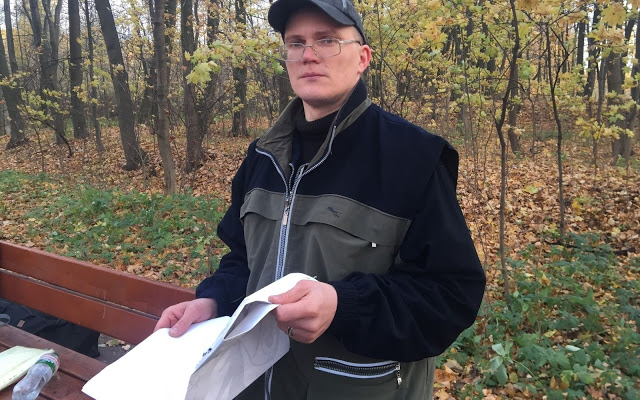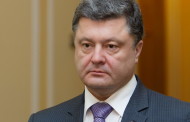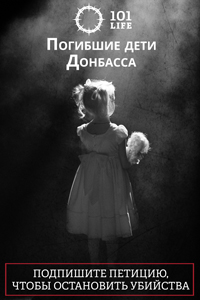Andrei Sokolov, kidnapped six months ago while leaving a Ukrainian court, has returned to Russia
By Julia Polukhina, Novaya Gazeta
October 15: Russian citizen Andrei Sokolov came to the Dontesk People’s Republic (DPR) on December 4, 2014, where, in his own words, he had planned to engage in humanitarian aid. But on December 16, 2014, he mistakenly drove his car into a Ukrainian roadblock near Gorlovka, was formally arrested on December 29, and ended up in the Security Service of Ukraine (SBU) office in Mariupol. Sokolov was charged under Part. 1, Art. 258-3 of the Criminal Code of Ukraine (assistance to a terrorist organization). Solokov’s lawyer, Valery Avzhenko, argued that there was insufficient evidence to convict Sokolov, and the evidence that existed had been obtained in violation of the rules and requirements of the Code of Criminal Procedure.
On April 15, 2016, Sokolov agreed to a deal with the prosecution: in exchange for a guilty plea , from April 15, 2016, onwards he received a lenient sentence in the form of a 2-year, 7-month term of imprisonment. According to the “Law of Nadiya Savchenko,” the term was counted according to the formula “two days for each day served.” It turned out that Sokolov had already served his full sentence, and he was released from custody in the courtroom.
But immediately after his liberation, Sokolov was abducted by four men and taken to an unknown location in a black Volkswagen car. After that, all communication with him was lost.
I tried for several months to find him, but on Saturday morning, he called himself, and explained the details of his abduction and release.
Andrei Sokolov: Six months ago I was still sitting in Berdyansk jail when I was visited by my lawyer and told that I was needed to exchange [for a prisoner exchange with the Donbass republics]. That is, it was not based on the court, but solely on the fact that the request came from the SBU for the exchange. Everything else was a mere formality. I was brought to the court one day, they reclassified the criminal charges, the court sentenced me, and after taking into account time served in jail, I was released from the courtroom. After the verdict, I came down from the second floor to the first, and shook hands with the lawyer. The lawyer said that he would make sure to take a photograph at the exit. And so, when we came out, a car was already waiting with masked officers. The lawyer asked only to take a single photo. He was given this opportunity, then they put me in a car and took me first to the detention center, where I was staying. There were a few of my bags, which I brought to the court from the prison. They had already taken away all those things, and I remained in the car. The lawyer was in the next car and watched it all. After that I was taken by a different road to Mariupol.
At the SBU in Mariupol there were only two or three rooms where it was possible to keep people. In one of them, the basement, I was held for two and a half months, and in another three and a half, so altogether, six months.
The first room was the usual sort of room near the shooting range. When I was there in the summer, there were two people, and two benches where they put them, their faces covered with rags, and poured water on them. I later found a rag in which one had been tortured. When these interrogations were going on, I was removed to another room. I made an attempt to escape from the shooting range: I disassembled the ventilation grate, climbed up, and I was caught by a machine-gunner; it was on the night of June 30-July 1. After that I was transferred to more stringent conditions, in the armory. There was an electric light, and I had a small radio with me, but I lost the sense of day and night without daylight.
In September, I was taken to a private apartment, because an OSCE commission was supposed to arrive at the SBU. In the private apartment I was guarded by one SBU officer, and the second guard, I realized, was a man of the volunteer battalion [neo-Nazis]. They let me out of my room only to use the toilet or to cook meals, for example.When I returned to the SBU in Mariupol, I saw that all my stuff had been tossed into a pile under a table, and some old computer placed there. Thus was created the impression that no one was ever held there.
Was there a bed in there?
There was an iron table, about 80 to 150 cm. I had a blanket and a pillow. The only problem was the lack of ventilation. If you closed the metal door, there was no circulation of air. First, they completely closed it, but then they began to slightly open one of the doors.
They brought you food?
No, there were special people who administered my meals. And at the apartment, and then in the SBU, twice a week, I wrote down on paper what I needed. For example, potatoes, onion, stewed beef. And twice a week they went to a nearby store called “Great Kyshenya” to buy provisions, I even have receipts where the date and what they bought is written. Then I put a hot plate on the floor and cooked for myself. By and large, the meals were fine, except for a few cases, when they forgot to bring me food for two or three days.
The guards had to take me twice daily to the toilet. I went out, and got a bottle of water. There were other bottles, which contained waste products, I had to wash them out and bring them back. So it was, every day, morning and evening.
Did they use force on you?
After trying to escape, I was left hungry and given a knock on the head. And so basically, I tried not to have conflict and to find common ground with those who guarded me. I wrote an official statement demanding one call to notify my mother. They never did let me call.
Were other people held with you?
I was completely alone, in complete isolation. Sometimes I heard someone brought in for questioning. I saw no one except for guards, and couldn’t pass anything to anyone. I only knew indirectly that someone had arrived – by the sounds.
Did you know that they were going to let you go?
On October 7, things started to happen. I was driven back to the apartment, I thought, because some commission was coming again. But then I was taken to Chongar, on the border with Crimea. On October 9, I rented a room there with a guard. And we, together with the SBU officers, went to the border crossing, but we were turned back by the Ukrainian border guards, because with my Russian passport, it turns out, we needed a special permit to travel to “occupied territory,” though to me, of course, it is not. Now, if I went to Kharkov, then it would have been easier, but for some reason they took me to Chongar. And then I was brought back to Mariupol, where I was kept in the apartment for several days, and on Friday morning I was brought to the area of Marinka, the Gnutova checkpoint. At this time shelling started, and two OSCE vehicles passed us.
The SBU officers put me in a taxi, paid the taxi driver, paid for the bus ticket from Donetsk-Moscow and gave me a phone. I have had two phones during my time in detention, but they gave me another with a different number. I found out it was useless as soon as I tried to call my parents to tell them that I was being freed. I could only buy a new SIM card when I was already on Russian territory. I safely crossed the demarcation line, then the taxi driver drove me to the bus station, I got on the bus, so there too everything was booked.
So why did this happen?
I understand that it was necessary that I disappeared before it could be proven that I was in Mariupol. The reason most likely is very simple: they thought I was to be immediately exchanged, and then, when it all dragged on, it turned out that I was being illegally held, and it was too serious a crime. They couldn’t risk the exposure that a person was being detained without court authorization.
PS: In February, 2016 in Odessa, another citizen of the Russian Federation, Vladimir Alexey Bezobrazov, disappeared under similar circumstances. Bezobrazov’s location is still unknown. Source
- Будь в курсе последних новостей и интересных статей, подписывайся на наш канал «NovorossiaToday»
- Be aware of the current events and interesting articles, subscribe to our channel «NovorossiaToday»
- Pour ne rien manquer de la derniere actualite et des articles interessants, suis notre chaine Telegram en direct«NovorossiaToday»









